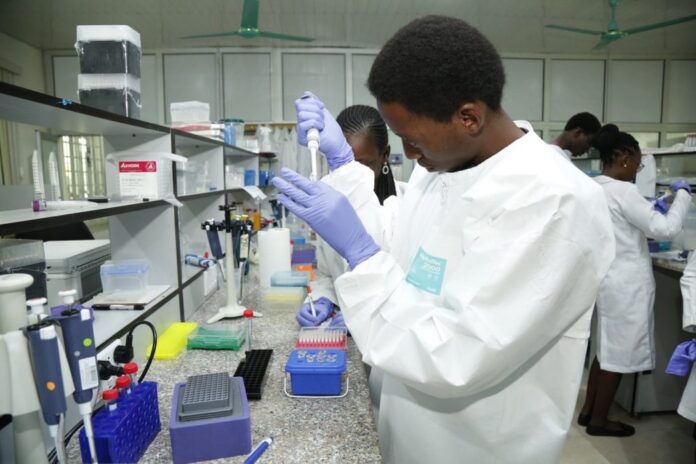A recent study by Ibe et al., (2023) titled “Advancing disease genomics beyond COVID-19 and reducing health disparities: what does the future hold for Africa?” published in Briefings in Functional Genomics by Oxford Academic Journal shows that genomics research in Africa has made significant progress and faced various challenges, especially in the context of the COVID-19 pandemic.
“
Genomics research in Africa, amid COVID-19 challenges, advances disease diagnosis, prevention, and control, emphasizing transformative potential, ethical conduct, and collaboration.– Ibe et al., 2023
Unlocking the genetic code of African populations has emerged as a beacon of hope in the realm of health research. This study delves into the current landscape and future trajectories of genomics research in Africa, spotlighting infectious diseases, non-communicable diseases, and the transformative impact of genomics amidst the challenges posed by the COVID-19 pandemic. The seismic shockwaves of the COVID-19 pandemic have prompted a rapid evolution in the application of genomics tools. The authors dissect how genomics has become an instrumental force in disease surveillance, diagnosis, and the quest for effective prevention and control measures. The narrative intricately weaves through the challenges encountered and the prospects that lie ahead, ensuring the lessons learned from the pandemic propel sustained advancements in genomics research. In the quest for scientific progress, ethical considerations stand as sentinels guarding the integrity of genomics research. The article navigates the complex terrain of ethical, legal, and societal issues arising from genomics endeavours in Africa. From data sharing and informed consent to the imperatives of privacy, the discourse underscores the delicate balance required to uphold ethical standards while propelling translational research that bridges the gap between discovery and application. A spotlight on genomics’ role in understanding and managing non-communicable diseases sheds light on groundbreaking insights. From cancer to HIV and TB, genomics research emerges as a powerful tool in unravelling the intricacies of diseases that disproportionately affect African populations. The authors commence with a panoramic view of the strides made in genomics research across the African continent. Pioneering initiatives and collaborative networks have played pivotal roles in fortifying capacity, and infrastructure, and fostering international collaboration. A nuanced exploration of key developments unfolds, showcasing a mosaic of efforts poised to redefine the future of African health research.
The Key Initiatives, Networks and Collaborations that have Advanced Genomics Capacity and Innovation in Africa
Human Heredity and Health in Africa (H3Africa): A consortium of African and international partners that aims to promote genomics research and capacity building in Africa, with a focus on common diseases and health disparities. H3Africa has established several research projects, biobanks, data-sharing platforms and training programmes across the continent.
African Society of Human Genetics (AfSHG): A professional society that aims to promote research, education and advocacy in human genetics and genomics in Africa. AfSHG has organised several conferences, workshops and training courses on genomics and related topics, and has collaborated with other organisations to advance genomics research in Africa.
African Genome Variation Project (AGVP): A collaborative effort to study the genetic diversity and variation of African populations using next-generation sequencing and other methods AGVP has generated genomic data from over 1,000 individuals from 18 African countries and has contributed to the development of a reference genome for African populations.
H3ABioNet: A pan-African bioinformatics network that provides training, support and infrastructure for genomics research and data management in Africa. H3ABioNet has developed several tools, databases and platforms for genomic data analysis, sharing and visualization and has trained hundreds of African scientists and students in bioinformatics and related fields.
African Collaborative Center for Microbiome and Genomics Research (ACCME): A research centre that focuses on the microbiome and genomics of infectious diseases in Africa, such as HIV, TB, malaria, and diarrheal diseases. ACCME has established several research projects, training programs, and collaborations across Africa and has contributed to the development of new diagnostic and therapeutic tools for infectious diseases.
These initiatives, networks and collaborations have contributed to building genomics capacity, infrastructure and innovation in Africa, and have enabled African scientists and institutions to participate more actively and equitably in the global genomics community.
What the authors found
The authors found that genomics research in Africa has made significant progress and faced various challenges, especially in the context of the COVID-19 pandemic. The study found that genomics tools can be leveraged to improve disease diagnosis, surveillance, prevention and control of infectious diseases in Africa, such as COVID-19, HIV, TB, malaria and fungal infections. The authors explore how genomics research can also advance and reshape cancer research in Africa, by identifying genetic variants, biomarkers, and drug targets for common and rare cancers.
Why is this important
The study’s implications resonate with the potential of genomics to provide a holistic understanding of genetic and environmental factors influencing disease outcomes. From infectious diseases to non-communicable ailments, the far-reaching impact of genomics is underscored, emphasizing the need for continued collaboration, innovation, and ethical conduct. The article concludes by envisioning a future where genomics seamlessly integrates into public health systems, fostering a healthier Africa.
In conclusion, the landscape of genomics research in Africa stands as a beacon of hope, navigating the challenges posed by infectious and non-communicable diseases, while resiliently adapting to the seismic shockwaves of the COVID-19 pandemic. The concerted efforts of key initiatives, collaborative networks, and ethical frameworks have propelled significant progress in capacity building, infrastructure, and international collaboration. As genomics tools continue to unravel the intricacies of diseases disproportionately affecting African populations, the study envisions a future where genomics seamlessly integrates into public health systems, fostering a healthier Africa. The journey from understanding genetic codes to practical applications underscores the transformative potential of genomics, urging sustained collaboration, innovation, and ethical conduct for a brighter and healthier tomorrow.
















 The African Research (AR) Index is a comprehensive scholarly directory and database focused explicitly on journal publishers that publish and disseminate African research.
The African Research (AR) Index is a comprehensive scholarly directory and database focused explicitly on journal publishers that publish and disseminate African research.

